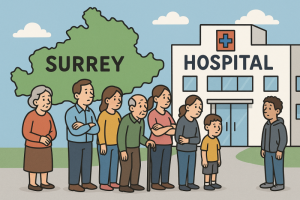Residents across Surrey and the wider South East are being asked to step forward and donate B negative blood, as the NHS warns that stocks of this rare blood group have dropped to critically low levels.
Stocks of B Negative Blood Hit Concerning Lows
Recent figures from NHS Blood and Transplant indicate that only 2,482 B negative donors in the region are currently eligible to donate, with overall donor numbers in dangerous decline. There are now fewer than 20,000 active B negative donors across the country, following a drop of 1,000 since last year.
B negative is exceptionally rare, present in just two percent of the population. This scarcity has raised serious concerns, as the NHS reports that patients with this group can only safely receive B negative or O negative blood. When B negative stocks run low, pressure increases on emergency supplies of O negative, the universal blood type.
Local Appeal and Priority Access for Donors
Existing B negative donors are being contacted directly and urged to book donation appointments as soon as possible. Anyone who already knows they have B negative blood, or suspects they might, is strongly encouraged to register and donate. Family members of B negative donors, meanwhile, are 30 percent more likely to have the same rare type—and are being called upon to consider giving blood.
Priority appointment slots will be made available to B negative donors struggling to find suitable times, and the NHS has appealed for the local community to act now, especially with increased summertime demand looming.
Why Your Donation Matters
Hospitals in England require more than 5,000 blood donations every day to support patients undergoing surgery, cancer treatments, managing sickle cell disease, or recovering from serious injuries. Each donation, which takes just an hour, has the potential to save up to three lives.
Besides B negative, donors with O negative and the extremely rare Ro blood are also desperately needed, especially to help treat sickle cell and other critical conditions.
How to Register
Men can give blood every three months and women every four months. Booking an appointment is fast and straightforward. Donors can:
- Visit the NHS Blood and Transplant website
- Use the GiveBlood app
- Call 0300 123 23 23
Donation sessions are held at permanent centres in nearby London locations, and through regular community sessions in town halls and other local venues across Surrey.
Local Voices
Gerry Gogarty, Director of Blood Supply at NHS Blood and Transplant, said:
“B negative donors are immensely important to our lifesaving work, but as one of the rarest blood types, it can be a challenge to always collect enough. Just a slight rise in hospital demand, or even one patient needing several units, can put supplies under severe strain. We urgently need B negative donors—regular and new—to come forward.”
The Bigger Picture
With the NHS needing up to 200,000 new blood donors nationally each year, the call is not just for today, but for a sustained community response to keep saving lives.
For more information, visit the NHS Blood and Transplant website or call 0300 123 23 23 to book your appointment. Every donation can make all the difference for someone, somewhere in need.

















